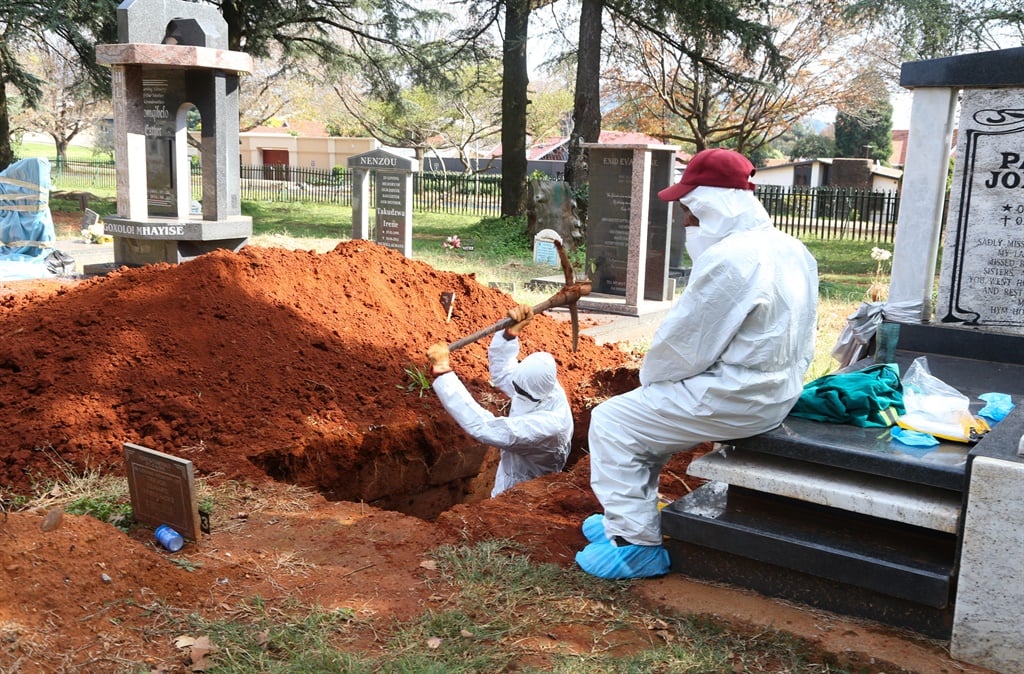


Workers in protective gear work at Westpark cemetery in Johannesburg.
Luba Lesolle, Gallo Images
- The testing of all bodies is for the government to have a better understanding of the number of people actually dying of the virus.
- While funeral undertakers have raised concerns, the health department says it will pay for the tests.
- However, tests on corpses will not be prioritised over those who are alive.
The Department of Health wants the bodies of all individuals who died of natural causes to be tested for Covid-19 before burial – in a bid to have a better sense of just how many people have died of the virus in the country.
But stakeholders, including funeral directors, are concerned.
This comes after the department’s director-general, Sandile Buthelezi, issued a directive on 12 August about the new development.
The circular advised doctors and funeral undertakers that people who die at home must be tested for Covid-19 by the medical doctor or clinician that certifies the death.
“Testing must be done before the human remain(s) were released to the funeral undertaker. The medical doctor/clinician must indicate on the DHA 1663 form that SARS Cov-2 samples have been taken,” the circular, which News24 has seen, states.
It also advised that the sampling process should not interfere with prescribed time frames set for keeping human remains during the state of disaster period.
But, following concerns raised, Pieter van der Westhuizen, the general manager of the country’s largest undertaker, Avbob, said the department clarified that swabs can be done at the morgues before the bodies are released for burials.
READ | South Africa’s first Covid-19 antibody tests finally offered – and we took it
However, Van der Westhuizen said there were still some unanswered questions, which range from who would be liable for the cost of the swabs, and where doctors would be found.
“Where are we going to send the test kits to? There is still a lot of unclarity. The was a meeting with the health department in Gauteng… where they said that they will request the national department to give clear direction to what needs to be done,” Van der Westhuizen said.
He added that, as stakeholders, they were supportive of the directive, but needed practical directions, so that parlours can have clear guidelines on the steps to be followed from the time a body leaves a deceased’s home and arrives at the mortuary.
Van der Westhuizen said they anticipated that the new process of having bodies tested would delay the process of releasing them for burials due to a variety of reasons, including the fact that parlours would have to wait for doctors, who were already in high demand, to take the swabs.
He added that the funeral industry would now be under pressure.
“If there are significant delays since we collected the deceased for burial, it could mean that our capacity will be put under strain and I don’t think that’s what government wants.”
Consultation
There is no need to wait for the results before a burial can take place, he said.
Van der Westhuizen said Avbob had instructed all its branches on the new directions and informed them that all bodies would now be treated as possible Covid-19. Staff would wear full personal protective equipment when picking up corpses from homes.
South African Funeral Practitioners Association president, Libo Mnisi, said it was important the department engages the industry before making such directions because there were multiple challenges that would emanate as a result.
Mnisi said, however, the department had since announced that death certificates can be released, even if a body has not yet been tested.
“We are still looking forward to having discussions with the government. The whole issue is about consultations. They should have consulted and gotten proper statistics [about] how we operate as funeral directors.”
ANALYSIS | Antibody test merry-go-round has SA waiting in limbo
According to the health department’s spokesperson, Popo Maja, the circular is yet come into effect.
He said the reasons behind the new guidelines were to give the government a better idea of just how many South Africans have died of Covid-19.
The spokesperson said the circular would not affect the usual issuing of death certificates once it comes to effect and that the government would pay for the tests.
While funeral directors worried about delays in the return of results, Maja said the tests will not be prioritised over the tests of people who are alive.
He added that, once guidelines were issued, details would be given on how the results of the tests should be released to families and what would happen after that.
“Again, the sole purpose of these post-mortem tests is to give public health authorities a fair idea of the number of deaths which are due to Covid19. The guidelines will indicate clearly as to who will take these swabs,” said Maja.
Funeral undertakers and the public have been advised to handle all natural deaths as if they were Covid-19 related, added Maja.

